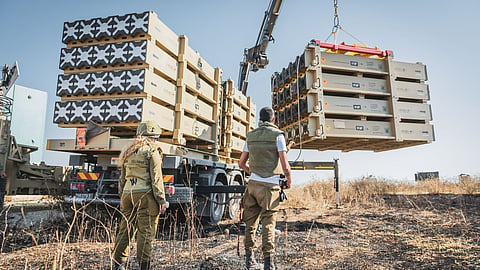
- NEWS
- the EDIT
- COMMENTARY
- BUSINESS
- LIFE
- SHOW
- ACTION
- GLOBAL GOALS
- SNAPS
- DYARYO TIRADA
- MORE

Tensions have escalated dramatically in the Middle East following Israel's targeted military operations in Lebanon, which led to the death of long-time Hezbollah leader Hassan Nasrallah. The international community has expressed growing concern, with key global powers like Russia and Germany weighing in on the potential consequences of Israel's actions.
Russia Urges Israel to Halt Operations
Russia on Saturday strongly condemned the killing of Hezbollah's Nasrallah, urging Israel to immediately cease all military operations in Lebanon. In a statement from the Russian foreign ministry, officials decisively criticized Israel for what they called a “political murder.” The ministry added, “We decisively condemn the latest political murder carried out by Israel and insistently urge it to immediately cease military action.” The Kremlin's strong stance reflects a broader concern over further destabilization in the region, which has been the center of complex geopolitical interests involving Israel, Lebanon, and Syria.
Russia has historically maintained close ties with Lebanon and a delicate relationship with Hezbollah, underscoring its strategic interests in the region. Moscow's call for a ceasefire indicates its opposition to any prolonged conflict that might draw in other actors or disrupt regional stability.
Germany Warns of Repercussions for Israel's Security
The German government also raised alarms, warning that the death of Nasrallah could have serious security repercussions for Israel itself. Foreign Minister Annalena Baerbock, in an interview with German TV channel ARD, described the situation as “highly dangerous” and highlighted the risk of further destabilization in Lebanon. Baerbock added, "The destabilization of Lebanon is in no way in Israel's security interest."
Germany’s statement reflects broader European concerns about the aftermath of Nasrallah’s death and how it could lead to increased tensions between Israel and Hezbollah, which has a strong political and military presence in Lebanon.
Military and Political Stakes in Lebanon
Israel’s strike, which took place in the Hezbollah stronghold of Dahiyeh in southern Beirut, has raised questions about the future stability of Lebanon and the larger region. Nasrallah had led Hezbollah since 1992 and played a significant role in the organization’s involvement in conflicts with Israel and Syria. His death, while seen as a victory by Israel, risks inciting further violence and deepening Hezbollah's retaliation efforts.
The Israeli military confirmed conducting a "precise strike" in the area following Nasrallah’s killing, stating it was part of broader efforts to neutralize Hezbollah’s influence. This comes amidst growing regional instability, exacerbated by existing tensions between Israel and Iran-backed militias across the region, particularly in Syria and Yemen.
As international pressure mounts, the world watches closely to see how this high-stakes situation unfolds. With Russia calling for an immediate ceasefire and Germany warning of destabilization, Israel's next moves could have far-reaching consequences. Both regional and global powers are navigating this fraught landscape, which could further shape the balance of power in the Middle East.
